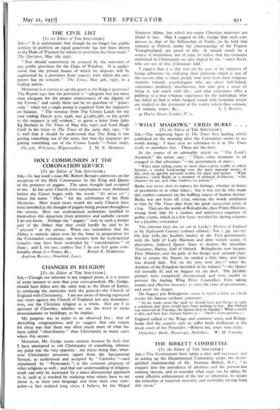" WHAT SHADOWS," CRIED BURKE • • [To the Editor
of THE SPECTATOR.] SIR,—The surprising lapse in The Times first leading article published on the morning after the Coronation seems to me worth noting : I have seen no reference to it in The Times itself, or anywhere else. These are the facts.
In the course of an admirable article on " The Lord's Anointed," the writer says : " There come moments to all engaged in that adventure "—the government of men-
" When their calling seems no more than a petty scuffle of selfiSh factions, a sordid huckstering over the mere material means of life, even an ignoble personal rivalry for place and power. ' What shadows,' cried Burke in a moment of political disillusion, ' what shadows we are, and what shadows we pursue ! ' " Burke was never slow to express his feelings, whether in hours of pessimism or at other times ; but it was not he who made this sombre comment on the baffling course of human destiny.
Burke was not born till 1729, whereas the words attributed to him by The Times date from the great succession crisis of
1714. They are the words of Bolingbroke, then Prime Minister, wrung from him by a sudden and unforeseen sequence of public events, which in a few hours wrecked his daring schemes for a Jacobite restoration.
The relevant facts are set out in Lecky's History of England in the Eighteenth Century (cabinet edition), Vol. i. pp. 201-07. On July 27th, the Jacobite leaders in the Tory government, with the help of Lady Masham and after violent scenes cf
altercation, induced Queen Anne to dismiss the irresolute Treasurer, Harley, Earl of Oxford. Bolingbroke now became First Minister, and the path of his design now seemed clear. But to restore the Stuarts he needed a little time, and time was denied him. For on the very next day—" when the destinies of the Kingdom trembled in the balance "—the Queen fell mortally ill, and on August 1st she died. The Jacobite plotter‘s were completely disconcerted, and were unable to prevent the leading Whig Privy Councillors from taking instant and effective measures to seize the reins of government, and avert the danger.
On August 3rd, Bolingbroke wrote to Swift a letter in which occurs his famous sardonic comment :
" In six weeks more [he said] we should have put things in such a condition that there would have been nothing to fear. But Oxford was removed on Tuesday, the Queen died on Sunday ! What a world is this, and how does fortune banter us ! " (Swift's Correspondence.) England rallied to the Whigs and common sense, and Boling- broke fled the country only to suffer fresh disillusion at the














































 Previous page
Previous page